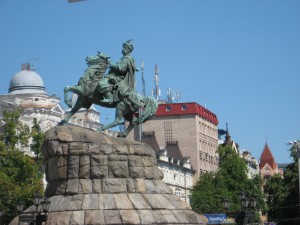A History of Kiev, Part 3 Posted by Natalie on Jan 24, 2011 in History
«Простите меня, дорогие читатели» [Forgive me, dear readers]. I have not posted in a long time because last week I arrived back at school and before that, «я задержалась в аэропорту» [I was delayed in the airport]. But now I am back and ready to teach you about Kiev’s history (parts 1 and 2 are here and here, respectively). In the photo: «памятник Богдану Хмельницкому» [a monument to Bogdan Khmelnitsky], taken by yours truly.
«Богдан Михайлович Хмельницкий родился в 1595 (тысяча пятьсот девяносто пятом) году» [Bogdan Mikhailovich Khmelnitsky was born in 1595]. No one is sure exactly what day he was born, but a Ukrainian historian has suggested that «его дата рождения» [his birthdate] was December 27. Not much is known about his early education either, but we do know that «Хмельницкий побывал в многих европейских странах» [Khmelnitsky traveled to many European countries]. He probably was well educated because he learned many languages: «он владел польским, латинским, турецким, крымскотатарским и французским языками» [he knew the Polish, Latin, Turkish, Crimean Tatar, and French languages].
«Хмельницкий» fought against the Turks and was held a prisoner in Constantinople for two years, after which «он вернулся в Суботов, его родной город» [he returned to Subotov, his hometown]. He became a member of the Cossacks. «Он женился на Анне Сомковне» [He married Anna Somkovna].
When a new Polish magnate came to power, he decided to seize Khmelnitsky’s estate. The Polish authorities refused to help «Хмельницкий». During all of this, «жена Хмельницкого умерла» [Khmelnitsky’s wife died].
Finally, discontented with Polish rule, Khmelnitsky rebelled. He led «восстание» [an uprising] in 1648. «Короче говоря, он победил и основал гетманство» [In short, he won and founded a Hetmanate]. «Переговоры с поляками» [The negotiations with the Poles] eventually led to a treaty with the Russian state, which in turn led to Ukraine’s incorporation into the Russian Empire. Khmelnitsky died in 1657 from a cerebral hemorrhage.
Though the history of Khmelnitsky is more about Ukraine as a whole than Kiev, it is still important. After all, Kiev has a huge monument to Khmelnitsky and it was into Kiev that Khmelnitsky marched to mark his victory. And it was Khmelnitsky who was instrumental in making sure that Ukraine would be closely tied to Russia, not Poland.
Next time, we’ll talk about the period up to «гражданская война» [the (Russian) Civil War], then conclude with an account of Ukraine as a part of the Soviet Union. Of course, if I am feeling very daring, perhaps I will talk about modern Ukraine as well…

Build vocabulary, practice pronunciation, and more with Transparent Language Online. Available anytime, anywhere, on any device.





Comments:
Natasha:
One small but important correction: «Хмельницкий побывал в многИХ европейских странАХ» – предложный падеж 🙂
Natalie:
Спасибо, Наташа. I’ve corrected the mistake. 🙂